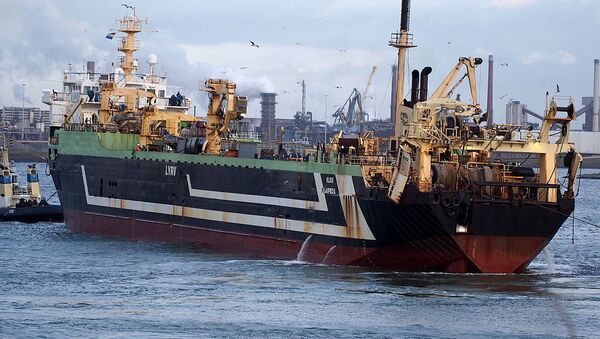Environmentalists are urging the UK government to seize Brexit as an opportunity to take control of British waters and stop the use of huge fishing supertrawlers, the Guardian reports.
Campaigners accuse the companies that use the massive tankers, which often measure hundreds of meters long, of unethical practices, specifically overfishing by dragging up huge quantities of fish from the sea every day.
Yet, Brexit will supply the UK government with the opportunity to rewrite the rules of the offshore fishing game, and will give them ample room to decide what kinds of foreign vessels are allowed to fish in their waters, and the quantity of fish they are allowed to catch. Moreover, it will give the UK the chance to decide how it will allow its own fishing companies to operate. It is here that campaigners are seeing the chance for the UK to lead the way in terms of sustainable fishing in order to preserve marine life.
According to reports, Greenpeace has called upon the government to take a “long, hard look” at whether continuing to allow the factory-sized ships to fish is a sustainable idea.
Greenpeace oceans campaigner, Chris Thorne, has been cited as saying that, “our government likes to boast about its credentials as a global oceans champion, but what about protecting our seas here at home?”
“Minister should take a long, hard look at whether allowing supertrawlers to operate in UK waters is compatible with sustainable management of our waters, as well as investigating the impact of the UK’s industrial distant water fleet in other countries’ waters,” he reportedly added.
Environmentalists argue that not only does the use of the mammoth ships lead to chronic overfishing, thus posing an existential danger to marine life, but that they also cause substantial damage to the sea beds by dragging huge nets across them in an effort to catch as many fish as possible. Campaigners are also reportedly suspicious that the use of the ultra large fishing vessels may also have something to do with the steadily creeping number of dolphins washing up dead on British beaches.
John Hourston from the Blue Planet Society, which described itself as a “volunteer pressure group campaigning to end the overexploitation of the world's oceans,” has been quoted as saying that, “it’s just been a long stream of dolphin deaths, I have never seen anything quite like it. We have had several storms but dolphins do not die because of weather, they are great swimmers.”
Suggesting that there is a connection between the use of supertrawlers and the spike in dolphin deaths, Mr Hourston added that, “we have just got mass dolphin die-offs and mass fishing fleets and the two correlate but we need more evidence.”
Mr Hourston went on to explain that he and his organisation believe that Brexit offers the “perfect opportunity to set the gold standard for environmental stewardship of the sea,” explaining that, “I am not talking about the inshore fisherman, I am talking about the industrial supertrawler fleets. We should not be allowing supertrawlers in British waters.”
Widespread calls for a ban on the use of the large vessels began to emerge in 2019, when a Lithuanian-registered tanker called the Margiris, which measures at 465ft long and had reportedly already been banned from Australian waters, spent a substantial amount of time fishing off the coast of southern England.
Despite the Margiris’ owners saying that the ship has a “excellent reputation for sustainable fishing,” a petition was launched among the British public to have it, and supertrawlers in general, banned from UK waters.
A spokesperson for the UK government’s Department for Environment, Food and Rural Affairs is quoted elsewhere as saying that: “as an independent coastal state [post-Brexit], we will have the right to decide who fishes in our waters and on what terms.This means we can design our own domestic fishing policy, one that supports our coastal communities and lets the UK lead the way on sustainable fishing.”




